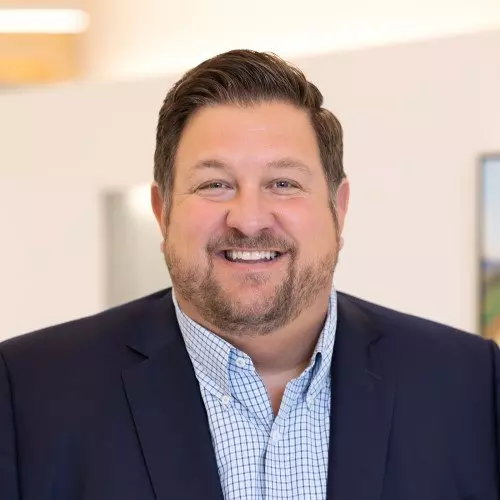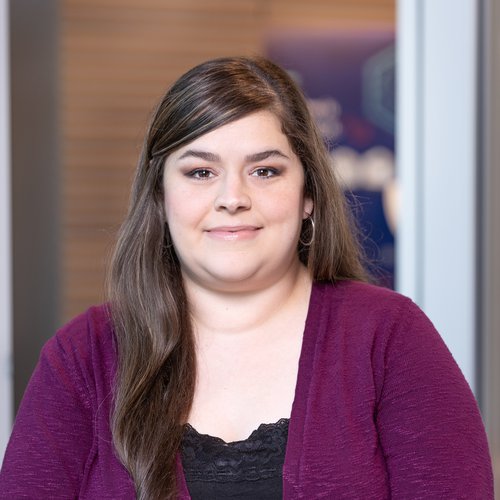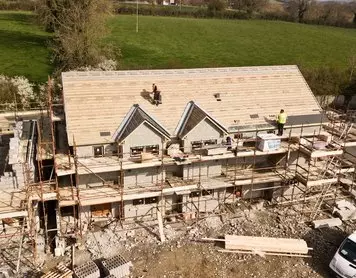Construction lending team shares advice to navigate home building
Building a home can be involved, including securing the financing to make it all happen. Our experts Chris Miller, Director of Construction Lending, and Assistant Operations Manager Callie Lawrence sat down to share their experience and seasoned insight to help you better prepare for and navigate the build process.
On beginning the process
Q: Where do you begin when thinking about building your dream house?
Chris: “Location, and that comes down to lot and land. That’s the first discovery question I’ll ask. Are you building on a subdivision lot, or will you build on acreage out in the country? From there, it's the scope of the build. What style of home do you want to build? How many square feet? How many bedrooms? Does it align with your budget? You may think you can build it for $500,000. But when you talk to a builder, you find out it will be closer to $750,000. From there, it would be financial prequalification planning with your lender and then packaging up your build plans and builder contract to proceed to closing.”
Q: Is there any way to avoid surprises with the cost?
Callie: “Most builders have plans they build over and over unless it's a custom builder. They have already built the same house somewhere else for someone else. So, they have a good idea of how much it will cost.”
Chris: “A true custom build – where a client drew it on a napkin and took it to an architect and said, that’s the house I want – it’s going to cost them way more than finding a builder that builds five or six different floor plans and saying ‘I like that one, tweak it this way.’”
Q: What advice would you give someone trying to decide what home to build?
Chris: “Two times a year here in the metro area, there's what's called the Parade of Homes sponsored by the Home Builders Association of Greater Kansas City. I advise seeing some of those houses, driving some subdivisions to get a feel for that builder, and looking at three or four of their homes. It will cost you way less money to pick out one of their plans than to go draw it on a napkin
On the state of your personal finances
Q: When it comes to your personal finances, what do lenders look for?
Chris: “You need to be in good standing and have adequate reserves. Lenders look for 5-10% of the loan amount in reserves, meaning assets like a 401(k), checking and savings accounts, and IRAs. This ensures that you could weather the storm if something were to go wrong. Also, most construction loans require 20% down of your contract price.”
Callie: “Unexpected circumstances arise when building. Some builders have contract clauses that make the borrower responsible for overages should the builder hit rock or encounter any unforeseen circumstance. Depending on the contract, you might have to come up with more money in those cases.”
On evaluating builders
Q: From your point of view, why is it important to carefully evaluate builders?
Chris: “The construction loan is one thing. The builder and what the contract states, and how that contract flows throughout the build is a huge piece of this puzzle.”
Callie: “You need to vet that builder. I would highly recommend calling people who have previously built with that builder so you can really get an idea of whether or not they stayed on the budget that was estimated or went way over. And if it did go over, was it because of the changes the borrower requested? There are just so many questions that they should be asking.”
Callie: "As the lender, we’ll do inspections on the house, but we are just doing inspections for progress, not for quality of work or to verify the way it should have been done. That’s where your builder or general contractor really comes in; they need to know what they’re doing and ensure they’re onsite."
On builder contracts
Q: What do people need to know about builder contracts?
Callie: “Builders have three main types of contracts with borrowers. Some builders will only do certain types of contracts. So, you need to understand whether the contract is a fixed-price, cost-plus, or cost-plus fixed fee. You also need to understand what clauses get added to those contracts.”
Chris: “With a fixed-price contract, the builder will say, ‘I’m going to build it for you for a fixed price of $500,000.’ With a cost-plus contract, the builder gets a percentage of the build's cost, usually 10 to 12%. With a cost-plus fixed fee contract, the builder charges a flat-rate fee on top of the cost to build.”
Callie: “With the fixed price contract, we don’t release any draw information to borrowers. So, you're unaware of how much is being submitted for payments to the subcontractors – you’re kind of in the dark. If you want to know what's going in and out, then the cost-plus contract is an option that lets you see everything. There are pros and cons to each.”
On the construction loan
Q: How does a construction loan work?
Chris: “What you see a lot is a two-time close. You have to take out a construction loan and refinance that loan to the permanent mortgage at the end of construction. We don't do that here at First Federal. We have a construction-to-perm loan that combines two loans into one – it’s the borrower’s construction and mortgage financing – so you don't have to do a takeout loan at the end. It's all done upfront, rate locked in upfront, and you close upfront.”
Chris: “Another important thing to note is that borrowers only pay interest-only payments on the amount that has been drawn at that time, not on the entire contract price. Also with new construction, know that taxes and insurance for your escrow account are only estimates and it may take a few years for those payments to balance out depending on the county.
Q: What’s the advantage of First Federal’s approach?
Chris: “The advantage is that borrowers know what they're getting into now compared to what the market will look like in 12 months.”
Callie: “It’s a one-time closing. The rate stays the same when we convert them to permanent payments. So, if they come in at a really great rate, they’re staying at that rate through the whole life of the loan. Plus, they'll know what their principal and interest payments will be from the start because we know the rate. And when we convert them to permanent payments, there are no additional fees.”
On a blanket loan option
Q: Can you explain a blanket loan?
Chris: “Let’s say you’re living in your current $400,000 house, which you own free and clear, and you want to build a new house for $800,000. You don't want to sell your home and find a rental for 12 months or sell other assets for the down payment. What we would do is loan you the $800,000, and we would put a 20% lien on your current house for $160,000. It’s not a bridge or swing loan where you would have payments and interest. You can live in your old house while building your new one so you don’t have to move twice. Once you finish your new house and sell your old one, the bank will receive $160,000 to cover the 20% down. No other bank in town does this.”
On the most important advice
Q: What is a key piece of advice you would give to someone looking to build?
Chris: “Vet your builder and their experience. Be patient and plan accordingly to your budget.”
Callie: “You really have to be able to sit down and have a conversation to be on the same page from the beginning. You’re going to hit hurdles. It's going to happen. It's just a matter of when. So, you definitely have to find someone willing to talk with you. I can't stress enough that you need to vet your builder. Call people who have built with them.”
The First Federal Difference
Q: What sets First Federal apart?
Chris: “We're a 90-year-old bank that's mutually held. We reinvest our profits back into the community. We've also been strong sponsors of the Kansas City Home Builders Association since 1948. We're committed to homeownership, and the construction loan we have is second to none. Our team is seasoned. We've heard over and over from builders that we’re one of the best in the market. It's experience and knowledge and how we work with builders.”
Callie: “We'll help answer any questions you have. I think our team is so good at that, knowing that this is new to each borrower. Most of them have never built before, and building a house from the ground up is a big thing in your life. We're here to help you with whatever you need.”
To learn more, download our free Construction to Permanent Loan guide that walks you through our process. If you’re ready to get started, email our team or call us at 816-525-LOAN.








